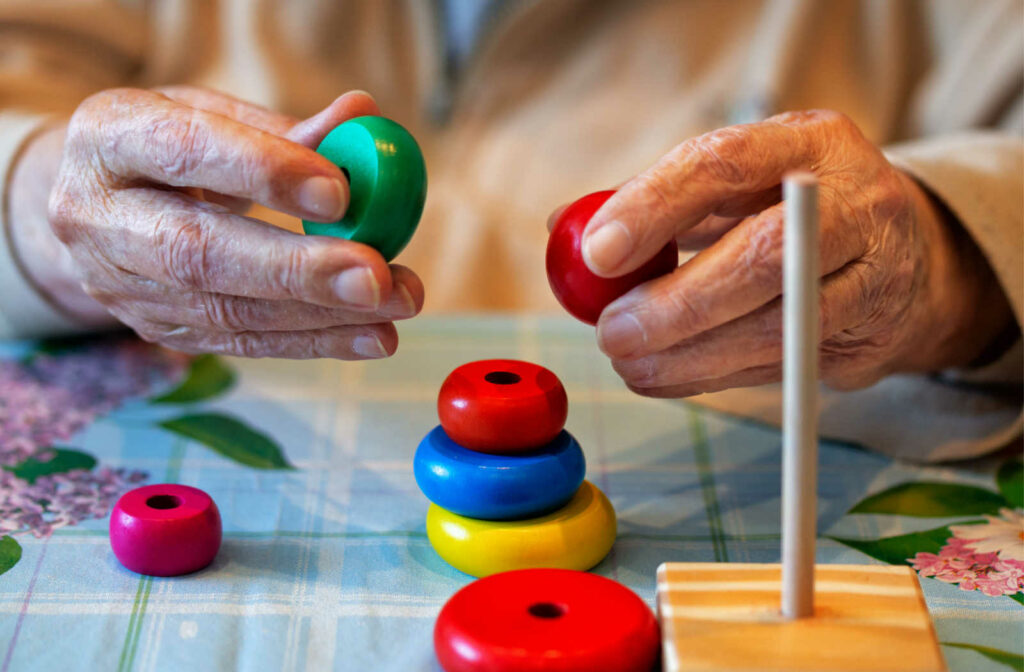As people get older, they may require more daily care. Assisted living is ideal for many older adults, but memory care may suit others better. Memory care can benefit many seniors, but you may wonder if it’s right for your loved one.
Learning about memory can help you know if this lifestyle is right for your loved one’s needs.
What Is Memory Care?
Memory care is a senior living lifestyle designed for older adults with Alzheimer’s or other forms of dementia. As dementia progresses, it can affect your loved one’s thinking, behavior, feelings, and more, making it difficult to live independently. Memory care provides a safe environment for seniors with cognitive impairment, helping them enjoy everyday life with the support they need.
What Does Memory Care Provide?
The staff in a memory care community provide residents with daily care and support, such as eating, dressing, hygiene, and mobility. However, that doesn’t cover everything.
Memory care staff treat residents with dignity and respect, provide them with opportunities to do the things they love, and help improve residents’ quality of life.
Because every person is unique, each resident in a memory care community receives personalized care plans that meet their needs. Your loved one has access to several services that help make their life easier, letting them focus on their hobbies and interests.
Some of the services provided in a memory care community include:
- Weekly housekeeping
- Linen service
- 24/7 on-site maintenance
- Daily dining
- Dedicated staff for resident needs
Additionally, there are amenities to help entertain residents and benefit their health, including fitness centers, group activities, spa treatments, and salons.
How Does Memory Care Compare to Assisted Living?
While memory care and assisted living both provide essential support for residents, the level of care is different.
Assisted living is ideal for older adults who need everyday care but not consistent support. Someone in assisted living may struggle with dressing themselves or using the restroom, but not with eating or mobility. Residents can always ask for more support if they require it.
Seniors in the later stages of dementia typically need 24/7 support, which is what memory care provides. Trained staff is available to help with the activities of daily living and whatever else residents need. Older adults in a memory care community have as much independence as possible, living life as they please, with someone always nearby to help.

When Can Memory Care Benefit Your Loved One?
Memory care provides the daily support seniors with dementia need, but it can be hard to know when someone may need it. You may wonder if your loved one is ready to move into a memory care community.
It can be difficult to realize your loved one needs extra support, but there are several ways to know it’s time for memory care.
Your loved one may benefit from memory care if they’re:
- Forgetting to pay important bills: People can be forgetful, but consistently missing payments may be a sign it’s time for greater care.
- Avoiding social opportunities or old hobbies: Isolation can worsen dementia symptoms—consider memory care if your loved one withdraws from the things they once loved.
- Struggling with time, place, or date: Memory challenges may be minor at first, but later stages of dementia can cause your loved one to forget when & where they are.
- Lacking personal hygiene: Unkempt hair, unbrushed teeth, or lack of bathing can be a sign your loved one needs more consistent support.
- Living in an unsafe home: Your loved one’s current home may not be suitable if they have dementia. It can even be dangerous if they have uneven floors or steep stairs.
- Forgetting to meet their daily needs: Your loved one may benefit from memory care if they forget to buy groceries, cook, or complete chores.
Give Your Loved One the Care They Deserve
Dementia can significantly affect your loved one’s ability to care for their daily needs. However, that only means they need extra help.
Memory care communities provide residents with the support they need, empowering them to live life to the fullest. Your loved one deserves consistent, compassionate care.
Contact The Lodge at Historic Lewes or book a tour to learn more about our Compass Memory Care community.




